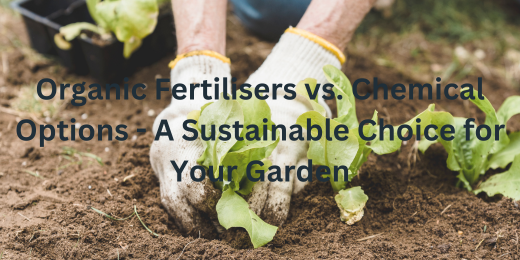
Organic Fertilisers vs. Chemical Options – A Sustainable Choice for Your Garden
Organic fertiliser vs chemical fertiliser
Introduction to Fertilisers
Fertilisers play a crucial role in gardening, ensuring plants receive essential nutrients for growth. When considering organic fertiliser vs chemical fertiliser, it is important to understand their different benefits and drawbacks. This choice significantly impacts the sustainability of gardening practices.
Organic fertiliser vs chemical fertiliser involves comparing natural and synthetic options. Organic fertilisers improve soil health and are environmentally friendly, while chemical fertilisers provide immediate nutrient availability but can harm the environment over time. Sustainable gardening favours organic options for long-term benefits.
Choosing the right fertiliser is vital for sustainable gardening. Organic fertilisers support ecological balance and promote healthier plants and soil. By understanding the differences between organic and chemical fertilisers, gardeners can make informed decisions that benefit both their gardens and the environment.
Benefits of Organic Fertilisers
Comparing organic fertiliser vs chemical fertiliser reveals that organic options significantly improve soil health and structure. They enrich the soil with beneficial microorganisms and nutrients, enhancing its overall quality. This makes them a vital choice for those committed to sustainable gardening.
Organic fertilisers are environmentally friendly and biodegradable, reducing the risk of soil and water pollution. Unlike chemical fertilisers, they do not leave harmful residues, making them safer for both plants and wildlife. This eco-friendly nature aligns well with principles of sustainable gardening.
Using organic fertilisers enhances the long-term fertility of the garden, promoting healthier plant growth over time. By gradually releasing nutrients, they provide a steady supply of nourishment. This slow release supports sustainable gardening, ensuring that plants thrive without depleting soil resources.
Drawbacks of Chemical Fertilisers
When comparing organic fertiliser vs chemical fertiliser, one major drawback of chemical fertilisers is the potential for soil degradation over time. These fertilisers can deplete essential nutrients and organic matter, leaving the soil less fertile. This poses a challenge for sustainable gardening.
Chemical fertilisers also pose a significant risk of runoff and water pollution. When it rains, excess chemicals can wash into nearby water bodies, harming aquatic ecosystems. This negative environmental impact contrasts sharply with the principles of sustainable gardening.
Additionally, chemical fertilisers can have harmful effects on beneficial soil organisms. They can disrupt the balance of microorganisms that support plant health and soil structure. This makes them less suitable for those who prioritise sustainable gardening practices.
Comparing Nutrient Content
When comparing organic fertiliser vs chemical fertiliser, the availability of nutrients differs significantly. Chemical fertilisers provide nutrients in a readily available form, while organic fertilisers release nutrients slowly. This difference impacts how plants absorb nutrients and the timing of their availability.
The release rates of nutrients in organic fertiliser vs chemical fertiliser also affect plant uptake. Organic fertilisers release nutrients gradually, promoting steady growth and reducing the risk of nutrient leaching. Chemical fertilisers release nutrients quickly, which can lead to rapid growth but may also cause nutrient runoff.
The impact on crop yield and quality varies between organic fertiliser vs chemical fertiliser. Organic fertilisers improve soil health over time, enhancing crop quality and sustainability. Chemical fertilisers often result in higher immediate yields, but their long-term use can degrade soil quality, affecting future crop production.

Cost and Accessibility
When considering organic fertiliser vs chemical fertiliser, the initial cost of organic options is often higher. However, the long-term financial benefits of organic fertilisers can outweigh the initial investment due to improved soil health and reduced need for additional treatments.
In sustainable gardening, organic fertilisers offer financial advantages over time. They enhance soil fertility and structure, leading to fewer future expenses. On the other hand, chemical fertilisers may require frequent applications and can degrade soil quality, increasing long-term costs.
In South India, the availability of both organic fertiliser vs chemical fertiliser is widespread. Organic fertilisers are becoming more accessible as demand for sustainable gardening practices grows. Chemical fertilisers remain readily available, but awareness of their environmental impact is driving a shift towards organic options.
Making the Sustainable Choice
Choosing between organic fertiliser vs chemical fertiliser is important for personal and environmental health. Organic fertilisers are free from harmful chemicals, promoting safer and healthier gardening. They also help maintain the ecological balance, crucial for sustainable gardening practices.
Supporting local and organic farming is vital for sustainable gardening. Using organic fertilisers encourages environmentally friendly practices and supports local farmers. Transitioning from chemical to organic fertilisers enhances soil health, ensuring long-term fertility and sustainability of your garden.
Transitioning from chemical fertiliser to organic fertiliser involves gradual steps. Begin by incorporating organic matter like compost to enrich the soil. Over time, reduce the use of chemical fertilisers, allowing the soil to regain its natural fertility and balance. Premium organic fertilisers are available at your local Uyir Organic Farmers Market or buy them online at www.uyironline.in and www.uyirorganic.farm.